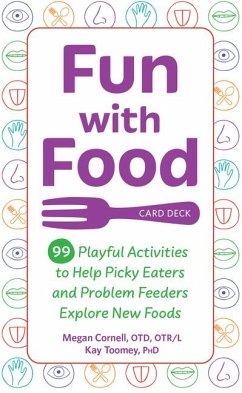Based on the 32 Steps to Eating created by Dr. Kay Toomey in her SOS Approach to Feeding, this card deck is designed to help children enjoy a more varied and nutritious diet by inviting them to interact with food in playful and nonstressful ways. Featuring 99 activities, this deck will help parents and therapists guide kids through six main steps - visually tolerating, interacting with, smelling, touching, tasting, and eating new foods - all while engaging in imaginative food-based games, songs, challenges, and art activities.
Hinweis: Dieser Artikel kann nur an eine deutsche Lieferadresse ausgeliefert werden.
Hinweis: Dieser Artikel kann nur an eine deutsche Lieferadresse ausgeliefert werden.








